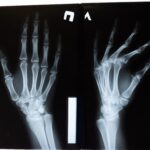Why Do I Have To Take My Thyroid Medication on An Empty Stomach in the Morning?

Taking thyroid replacement medication can help you combat symptoms of hypothyroidism such as depression, muscle aches, constant tiredness, weight gain, thinning hair, slow heartbeat, and sensitivity to cold so you feel like your normal self again.
However, you can’t just take your thyroid medication whenever or however you want. There’s a specific routine and process that you need to follow to ensure that the drugs work properly and provide your body with the maximum benefits.
In this article, we are going to explain some of the common guidelines for using the medication so you can understand the importance of following them religiously.
How synthetic thyroid hormones work
Thyroid hormones are responsible for boosting cellular metabolism which oversees growth, tissue development, food processing, heartbeat rate, regulation of body temperature, brain function maintenance, and many other cellular activities.
As a result, insufficient or abnormally low thyroid hormone levels in your body can create problems and throw various bodily functions into disarray.
Your thyroid gland naturally produces two main hormones: triiodothyronine (T3) and tetraiodothyronine or thyroxine (T4). Of the two hormones, T3 is the more active one and it regulates most of your biological processes.
However, most of the T3 in your body starts out as T4, but when the T4 is released by your thyroid gland and it interacts with other cells in your blood, it loses one iodine atom. When this loss occurs, the T4 then transforms into T3 which your body uses to carry out different cellular metabolic processes.
When your thyroid gland is not functioning as it should and is failing to produce enough of the thyroid hormone, the standard course of treatment used to rectify it is synthetic thyroid hormone, also known as levothyroxine.
Synthetic thyroid hormones simply mean that the hormones are man-made, rather than naturally derived from animals. Despite being man-made, synthetic hormones are able to mimic the T4 hormones that are naturally produced by your body.
When you take synthetic thyroid medication, the aim is to make up for the insufficient hormones being supplied by your thyroid gland. It typically comes in pill form containing T4 or a combination of T3 and T4, and once you swallow it, your body will absorb it and convert it into the T3 your cells need to perform certain actions.
Why you need to take your thyroid medication first thing
How and when you take your thyroid medication can make a huge difference to your recovery process. Doctors usually recommend taking levothyroxine first thing in the morning, with water, at least 60 minutes before you eat or drink anything. Here’s why:
Food can stop your body from absorbing it
The absorption of thyroid stimulating hormone can be negatively impacted when you take it with or too close to certain foods. Eating food can interfere with your daily dosage and prevent the medication from being completely absorbed into your gut, which means it won’t work like it is supposed to and your thyroid disease might worsen.
Even after taking your medication on an empty stomach, it is recommended that you avoid eating some kinds of food much farther apart from the time you take your medication because they can still affect your body’s ability to absorb the drug and cause fluctuations in your thyroid hormone levels. These foods include:
- Walnuts
- Cottonseed meal
- Grapefruit or juice
- Fried, fatty, or sugary foods
- High calcium foods like milk, cheese, yogurt, or milk derived from plants
- Soy-based foods or flours like tofu, miso, edamame
- Foods that are high in fiber like kale, cabbage, broccoli
An easy way to maximize absorption and ensure that you take your thyroid medication first thing in the day is by setting an alarm for 5/6 AM, taking your daily dosage, and then returning to sleep if necessary. This way, you will be taking it on an empty stomach and will have plenty of time between when you take your medication and your first meal of the day.
Other medications interact with it
If you are taking other medications, they could end up interacting with your thyroid drugs in the wrong ways, which is why it is important to avoid using other medications at the same time or too close to thyroid stimulating hormones.
Some common prescriptions and over-the-counter medications that can interfere with the way your thyroid medication is absorbed and reduce its effectiveness include:
- Birth control pills
- Antibiotics like ciprofloxacin, ofloxacin, or levofloxacin
- Blood thinners like warfarin
- Anti-seizure meds like phenytoin, carbamazepine
- Cholesterol-lowering drugs like cholestyramine (Questran), colesevelam (Welchol)
- Antacids like Tums, Omeprazole, Pantoprazol, or Pepto-bismol
- Antidepressants like fluoxetine, sertraline, amitriptyline, or theophylline
Try to take other medication at least two hours after using your thyroid hormone replacement drug. However, for drugs like antacids, sucralfate, cholesterol pills, gas relievers, and calcium or iron supplements, it is highly recommended that you wait four hours after or before taking your thyroid medication.
Taking it first thing keeps you on a regular schedule
Your thyroid medication won’t work properly if you don’t take it consistently. If you take it in the evening on some days and in the morning on other days or even forget to take them sometimes, it can interfere with how the drug is absorbed and lead to fluctuations in your hormone levels.
When this happens your thyroid blood tests which are used to track and manage dosages for optimal therapy won’t show accurate results. Your doctor might interpret the changes in your thyroid hormone levels to mean that you are not on an appropriate dose and increase your dosage accordingly. Meanwhile, the problem is with your irregular and inconsistent use of the medication, and not with the dose.
Constant adjustments to your medication can make it harder to regulate your thyroid levels and improve your well-being so you can live your life to the fullest. The best way to get the most out of your medication is to take the prescribed dose around the same time, in the same manner, every single day.
It is harder to forget to take your meds in the morning than at other times during the day. This is because in the morning, your mind is clearer and you have not yet begun doing all the things that could distract you, so you can easily remember to take your drugs before the chaos of the day creeps in.
Can you take your thyroid medication at bedtime?
Although the usual advice is for patients with thyroid disease to take their medication in the morning, it’s also perfectly acceptable to take it at night too if that’s the more convenient option for you.
If you cannot afford to give up adding milk to your morning cereal or coffee, taking levothyroxine at night can help you avoid improper absorption. You can also consider switching from morning to bedtime administration if you have a consistent sleep schedule.
Before deciding whether you are better off taking your thyroid medication at bedtime, you need to know that it must be administered four hours after your last meal or snack for the day. If you are taking other drugs in the evening, they must also be administered four hours before you use your thyroid medicine.
Pros
- Some research suggests that taking thyroid stimulating hormones at night may improve your body’s ability to absorb the drug.
- Taking levothyroxine at bedtime can also reduce the likelihood of interactions with other drugs or supplements that you might take in the morning.
- You don’t have to bother with timing your breakfast or eliminating certain foods that can interfere with absorption.
Cons
- You can easily fall asleep or forget to take your medication at night time.
- You might keep snacking throughout the night and fail to leave four hours between eating and when you take your thyroid medication.
- Some thyroid hormones are energizing and can make it difficult for you to sleep when taken at bedtime.
- You may not retire to bed at the same time every day and inconsistency in your routine can cause changes in your thyroid hormone levels.
What to do if you miss a dose of your thyroid medication
There is no need to panic if you miss a dose of your medicine. Just take the missed dose as soon as you remember and all will be fine. However, if you don’t remember early enough and it’s almost time for your next scheduled dose, skip the dose you missed and continue taking your medication on your normal dosing schedule.
Never take a double dose to make up for the dose you missed. You can also speak to your doctor to find out what approach they would like you to take when you miss a dose of your thyroid medicine.
Over to you
With thyroid replacement therapy, consistency is everything. Whether you are taking your medication in the morning or at bedtime, the most important thing is to ensure you use it at the same time every day. Plus, remember to stay apart from food, drugs, and supplements that can reduce its efficacy.
With Health Hero Pharmacy, you can get your thyroid medication at competitive prices and have it delivered to your doorstep. We also provide access to a healthcare team who can help you create personalized therapies to effectively manage your thyroid disease and other health concerns.
Get started today!
Sources:
- https://www.mayoclinic.org/drugs-supplements/levothyroxine-oral-route/proper-use/drg-20072133
- https://www.webmd.com/drugs/2/drug-1433-2020/levothyroxine-oral/levothyroxine-solution-oral/details
- https://www.healthline.com/health/hypothyroidism/what-your-pharmacist-may-not-be-telling-you#Can-thyroid-hormone-interact-with-any-of-the-other-drugs-I-take?
- https://www.btf-thyroid.org/living-better-with-hypothyroidism
- https://www.everydayhealth.com/hs/healthy-living-with-hypothyroidism/avoid-hypothyroidism-medication-mistakes/
- https://www.uclahealth.org/endocrine-center/how-to-take-thyroid-hormone




